One year after COVID-19 vaccines were introduced, high-income countries are securing themselves the majority of the vaccines. The vaccine supplies of many low-income countries are not even sufficient to cover their most vulnerable population groups. While the vaccination rate for most high-income countries is above 70%, the rate for African nations currently stands at 11%. And this imbalance is continuing, with around 60% of all vaccinations worldwide being booster shots. Global vaccine production was stepped up significantly during 2021, and UNICEF forecasts a quadrupling of manufacturing volumes in 2022. However, the question remains, why aren’t we exhausting all the options for increasing vaccine production levels worldwide? After all, according to yesterday’s World Day of Social Justice, social justice in 2022 must also mean vaccine justice.
One means of achieving global vaccine justice is to issue a temporary waiver of vaccine patents. This proposal has been supported since October 2020 by what is now a significant majority of World Trade Organization (WTO) member states. The main arguments for waiving patents are obvious: first, it was not possible to accelerate the development of effective COVID-19 vaccines with private investment alone. In both North America and Europe, the process has been supported through high public expenditure. Second, COVID-19 is a global pandemic with persistently high mortality rates. It is considered a case of “force majeure”, which, according to relevant regulations, including the WTO rules, warrants the temporary suspension of intellectual property rights.
Opponents of this step argue that a waiver would create a negative incentive for private investment in vaccines, serving to discourage such investment in the future and leading to a reduction in available vaccines. They contend that sufficient amounts of vaccine are now being produced and that the problem lies instead with distribution, logistics and people’s willingness to be vaccinated.
These opponents are correct to a degree in that a patent waiver would not automatically bring about vaccine justice. Consideration must also be given to many other challenges, such as the establishment of manufacturing processes, and knowledge and technology transfer. However, the temporary waiver is a necessary building block when it comes to increasing vaccine production in low-income countries. Moderna is the only company so far to publish the formula for its mRNA vaccine and declares not to enforce patents related to its mRNA vaccine during the pandemic.
It is regrettable that vaccine providers have not given due consideration to the patent pool solutions proposed early on in the pandemic and based on the Medicines Patent Pool (MPP) established by the International Drug Purchase Facility (UNITAID) in 2010. Supported by the United Nations, the MPP is a health organisation that works to improve access to and promote the development of life-saving medication in low- and middle-income countries.
Nations in which vaccine manufacturers are based and have received public funding should thus call upon manufacturers to place their patents in the MPP. Such a move would be voluntary, based on the statutes of the MPP. It is important that cooperation is not limited to the sharing of chemical formulae only, but also includes the active transfer of knowledge (about supply chains, for instance) and technology for establishing high-quality mass production processes. Researchers recently published a list of 120 companies worldwide that could manufacture the mRNA vaccine if they were provided with the technology. The voluntary award of patents in conjunction with technology and knowledge transfer is the most sustainable method of ramping up vaccine production and contributing in the medium term to vaccine justice.
Initial steps have already been taken in this direction, with the World Health Organization (WHO), the MPP and several South African firms joining forces to set up the first mRNA technology hub in South Africa. This hub is intended to serve as a research and training centre for Africa as a whole and beyond. Based on Moderna’s mRNA vaccine, this centre will adapt the mRNA vaccine with regard to new COVID-19 virus variants. Rather than being patented, the newly adapted vaccine would then become an open source technology. Importantly, this technology would also be used in future for other mRNA vaccines against HIV, tuberculosis and malaria, and, for the first time, enable many African countries to produce their own vaccines.
It is now vital for further vaccine manufacturers to participate in the mRNA hubs and support the required technology and knowledge transfer. The high level of international pressure on this front should be leveraged to bring more companies on board. Additionally, there is a need to significantly expand the support currently provided for these hubs by the international development cooperation community. This is especially paramount given that the mRNA hubs will play a key role not only in the development of COVID-19 immunisations, but also in the production of other vaccines in the medium term. Unless we provide the whole world with vaccines, we will fail to achieve a more socially just world in the foreseeable future.
This publication first appeared on the DIE site.
Author: Christoph Strupat.
The views are those of the authors and not necessarily those of ETTG.
Related posts:
 Synthesis note: Strengthening the continent-to-continent dialogue on sustainable development
Synthesis note: Strengthening the continent-to-continent dialogue on sustainable development
 Vaccine hesitancy as a global challenge – Why rebuilding trust in governments is key to end COVID-19
Vaccine hesitancy as a global challenge – Why rebuilding trust in governments is key to end COVID-19
 The Covid-19 Crisis and the Mediterranean Basin: Overcoming Disparities, Promoting Genuine Cooperation
The Covid-19 Crisis and the Mediterranean Basin: Overcoming Disparities, Promoting Genuine Cooperation
 Looking ahead to 2022 – Health, climate and geopolitical relations
Looking ahead to 2022 – Health, climate and geopolitical relations

